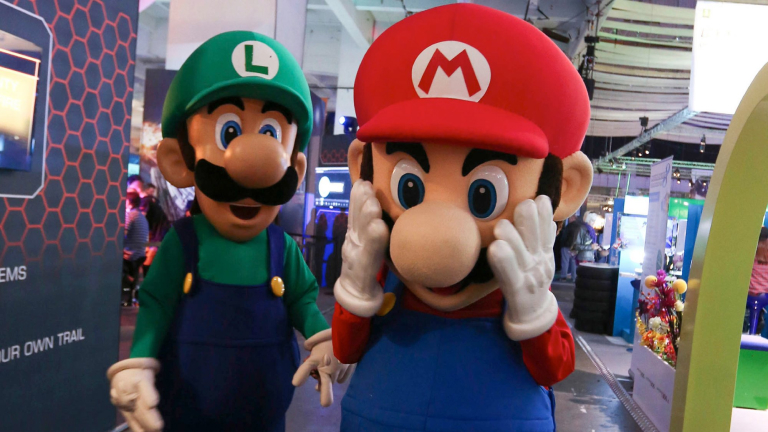Nintendo, and Super Mario specifically, have tremendous equity among traditional gamers. So when the Super Mario game was announced for the first time on mobile at Apple’s press event in September this year it was a huge moment in mobile gaming. Super Mario creator Shigeru Miyamoto went on stage to demonstrate the game to a rousing applause.
Since then the game launch has been covered across several online publications, building up expectations. The game was launched last week (here is a good review of the game) as free to download but a one-time charge of $9.99 to play the full version. The game also requires an active internet connection to be played (to fight piracy mainly).
The initial download numbers have been fantastic. According to Business Insider:
As this chart from Statista shows, early estimates from app intelligence firm Sensor Tower pegs “Super Mario Run” as having attained five million downloads and $5 million in gross revenue in its first day. That’s significantly ahead of other smash hits like “Pokémon Go” and “Clash Royale” over the same time frame. Beyond that, a newer report on Monday claimed “Super Mario Run” surpassed 25 million downloads and earned more than $21 million in revenue after four days. Sensor Tower says the former is a record, ahead of the 11 days it took “Pokémon Go” to reach the milestone.

Surprisingly, the app has received a lot of low ratings (nearly half of the over 50,000 reviews are a single star). What is being debated hotly are the reasons for the poor ratings, the soundness of the pricing strategy and the negative impact on Nintendo shares (company’s shares were down more than 10% after launch) as a result of the early negative feedback. Some have argued that Nintendo was right in pricing it high so as to preserve the premium nature of the brand. Only time will tell if Super Mario Run is a money-spinner in the long run and does not end up being a fad. Observing the launch, here are some early takeaways for app publishers about app launches and marketing:

1. Download numbers aren’t everything: While the download numbers are high for Super Mario Run, it fares poorly in terms of engagement when compared to Pokemon Go or Clash Royale. Similarly for app owners, building an audience, increasing app engagement and repeat usage should be the key metrics to chase and not just download numbers.
2. Brand legacy has its limits: Undoubtedly, Nintendo has tremendous equity among gamers. Many of them are likely to have grown up on games created by the brand, but not on mobile. Nintendo’s foray into mobile has been recent and the audience in this domain are unlikely to have a strong, residual imagery of the company brand. A large chunk of casual gamers are used to free to play games with in-app purchases to the tune of few cents or dollars. The quality of such games too has improved over the years in terms of graphics, story line and gameplay mechanics. So for this new audience the halo of a company brand doesn’t mean much. So when a traditional business which has earned its reputation in another era, from another audience attempts to create engagement through a mobile app or game, the equity of the brand name should not be taken for granted.
3. Factors beyond app design or functionality affect app ratings: A poor experience at a brick & mortar outlet of a brand may very well negatively impact a user’s perception towards the brand’s app. On such occasions, the best of app design or functionality cannot erase the overwhelming negative feeling towards the brand. We’ve had to face situations where despite the app being designed well, consumers left a poor rating. Upon investigation we found that poor offline experience (say delayed or incorrect deliveries for a food or e-commerce brand) led to the app being down-rated. So app owners should see the app as part of an overall brand experience and the customer has to be delighted at every touch point of the brand, not just the app. In the case of Super Mario Run, the psychology of the high price barrier (for an audience used to paying lower in-app purchases) and the need for an internet connection to play may have resulted in users venting their frustrations on the ratings.
4. The best apps will make use of newer, more engaging technologies: The runaway hit game of the year, Pokemon Go, made creative use of augmented reality to get players out into the real world. Similarly, some of the other notable and popular apps of recent times have made use of technology in a creative way, for example, the way the Prisma App uses AI to generate artistic impressions from photos, as well as the way Snapchat and Facebook have enabled filters to spice up ordinary images. Other apps like Musical.ly use the social aspect by involving friends and others into an addictive loop of “likes” and “follows”. These days, coming out with a run of the mill platformer or endless runner, even if you have the most famous character in gaming history, will not get you too far: case in point – Flappy Bird – which turned out to be a flash in the pan.
Of course, the story is not over yet. As Facebook (which once witnessed a similar mighty fall in stock price, when people said it did not get Mobile) might say, “rumors of my demise have been greatly exaggerated”. Facebook worked tirelessly to make Mobile a top priority for the company, and spared no expense in turning the company into a Mobile-first company, making acquisitions where needed to bolster their internal efforts. Today it is a force to be reckoned with on Mobile. Will Nintendo be able to pull out the same, or it will it shrink into oblivion like the once-mighty giants Nokia and Blackberry?
An edited version of the article first appeared here.





